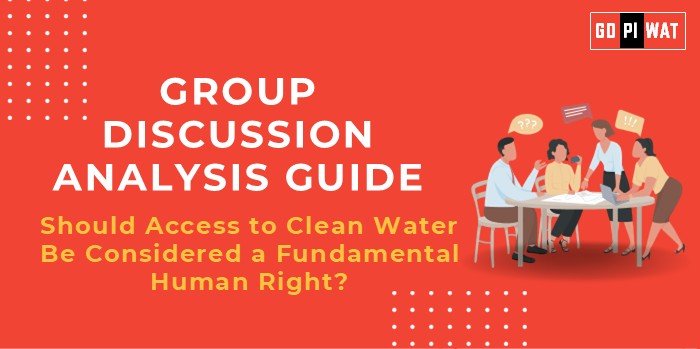📋 Group Discussion (GD) Analysis Guide
🌍 Should Access to Clean Water Be Considered a Fundamental Human Right?
🌐 Introduction to the Topic
Context Setting: Clean water is essential for life, yet billions globally lack access to safe drinking water. Recognizing clean water as a fundamental right underlines the importance of health, dignity, and equity, vital for sustainable development.
Topic Background: The United Nations recognized clean water and sanitation as a human right in 2010. Despite global efforts, approximately 2.2 billion people lack safe water access. Recent water crises, such as in Cape Town and Flint, Michigan, highlight the urgency of addressing water inequality.
📊 Quick Facts and Key Statistics
- Global Access: 2.2 billion people globally lack safe drinking water (UNICEF, 2023).
- Health Impact: 829,000 annual deaths are linked to unsafe drinking water (WHO).
- Economic Loss: Water scarcity costs the global economy $260 billion annually (World Bank).
- Sustainable Development Goals: SDG 6 aims for universal access to water and sanitation by 2030.
👥 Stakeholders and Their Roles
- Governments: Policy-making, funding water infrastructure, and ensuring equitable distribution.
- NGOs: Advocacy, funding small-scale projects, and community awareness campaigns.
- Private Sector: Innovating water-saving technologies and investing in water infrastructure.
- Global Organizations: WHO, UNICEF, and the UN spearhead global initiatives and standards.
- Citizens: Responsible water usage and advocacy for local water rights.
🏆 Achievements and Challenges
Achievements:
- India’s Jal Jeevan Mission: Over 110 million rural households provided with tap water by 2024.
- Africa’s Water Program: Improved water access for 45 million people in 37 countries since 2012.
- Innovative Technologies: Companies like LifeStraw provide affordable water purification solutions.
Challenges:
- Inequality: Over 80% of wastewater globally is released untreated into the environment.
- Climate Change: Increased droughts and water stress exacerbate scarcity.
- Infrastructure Gaps: Developing regions face funding and technical barriers.
🌎 Global Comparisons
- Success: Singapore’s NEWater project achieves 40% of water reuse.
- Failure: Cape Town’s 2018 “Day Zero” crisis, where water supply was nearly exhausted.
📚 Case Studies:
- Flint, USA: Public health emergency due to lead-contaminated water.
- Kerala, India: Comprehensive water literacy campaigns reduce waterborne diseases.
💡 Structured Arguments for Discussion
- Supporting Stance: “Access to clean water as a right ensures equity and dignity, essential for public health and sustainable growth.”
- Opposing Stance: “Making water a right might create unrealistic obligations for resource-stressed nations.”
- Balanced Perspective: “Water as a right is crucial but requires sustainable management frameworks for practical realization.”
✍️ Effective Discussion Approaches
- Opening Approaches:
- Statistical Hook: “Over 800,000 lives are lost annually due to unsafe water—this is a crisis of both humanity and governance.”
- Case Study Lead: “The Flint water crisis is a stark reminder of why water access needs a rights-based approach.”
- Counter-Argument Handling:
- Present balanced data: Recognize resource challenges but emphasize long-term benefits.
- Propose realistic solutions: Encourage public-private partnerships and innovative technologies.
📊 Strategic Analysis of Strengths and Weaknesses
Strengths:
- Improved public health.
- Reduced inequality.
- Increased economic productivity.
Weaknesses:
- Cost-intensive infrastructure.
- Potential overuse.
- Enforcement issues.
Opportunities:
- Innovations in water recycling.
- Global aid programs.
Threats:
- Climate change.
- Geopolitical disputes over shared water resources.
🎓 Connecting with B-School Applications
- Real-World Applications: Link with water sustainability strategies in supply chain management or corporate social responsibility.
- Sample Interview Questions:
- “What innovative strategies can companies adopt to tackle water scarcity?”
- “How would you address water inequality in urban slums?”
- Insights for B-School Students:
- Understand water management for ESG initiatives and sustainable business models.


